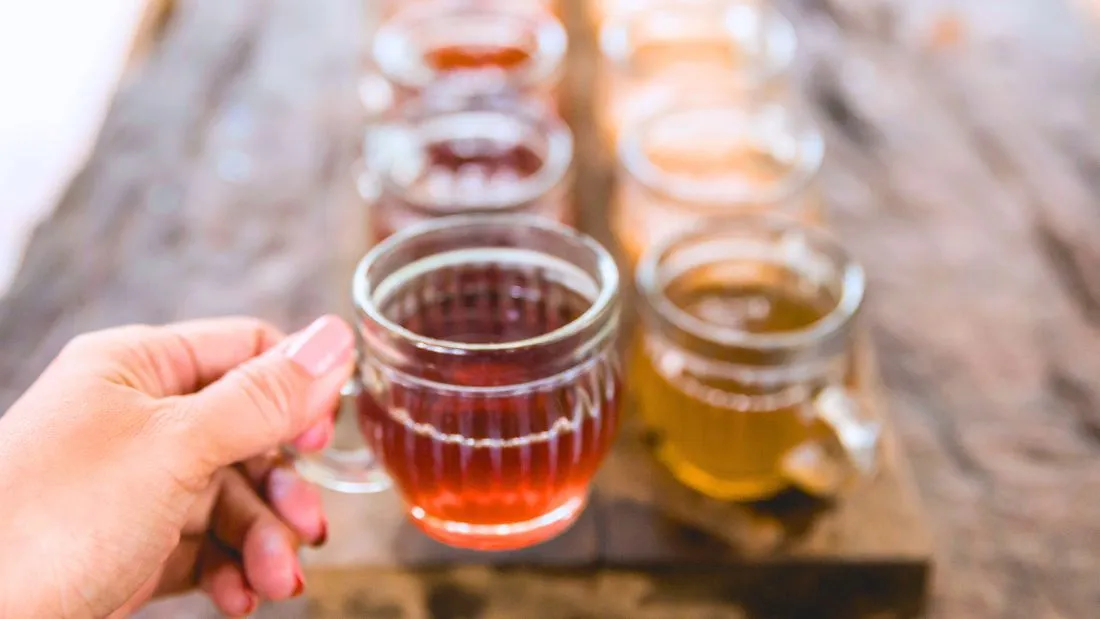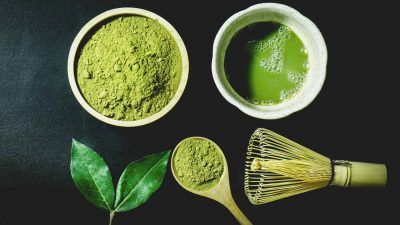Tea – Green Versus Black

Is there a winner or is it a score draw?
It may come as a surprise that green tea and black tea are both leaves of the same plant – the tea plant, Camellia sinensis. It’s the variety of plant and how the leaves are processed that determines which is which.
Camellia sinensis sinensis is typically used to make green tea and Chinese black tea, while Camellia sinensis assamica is grown to produce Assam (Indian) black tea.
How is green tea made?
Freshly harvested tea leaves are quickly heated either by pan firing (dry heat) or steaming (wet heat). This brief heat exposure turns off the enzyme that would otherwise enable the leaves to oxidise, which would result in a change in flavour and colour. The quick heating ensures that the green pigment and antioxidant chlorophyll is preserved.
The next step is rolling, done in order to break open the leaf cells to release essential oils which give green tea its characteristic flavour. The leaves are then dried and sorted.
How is black tea made?
The processing of leaves for black tea differs from green tea at the start. Freshly harvested leaves are spread out in an even layer and left to wilt – or ‘wither’ according to tea terminology.
Leaves are then rolled to break open the leaf cells in order to release their enzymes and essential oils. This also initiates the oxidation process responsible for black tea’s colour and flavour. The leaves are left to oxidise for several hours.
The last step is drying at high heat, which stops the oxidation process and locks in the desired qualities of the particular type of tea.
What do they have in common?
Both green and black tea contain the amino acid L-theanine, which helps to reduce anxiety, improves your mood and calms you down. It doesn’t make you drowsy, it just makes you feel good! Green tea tends to have a little more than black. The content of L-theanine depends on the growing conditions, time of harvest and the processing – conditions and timings can vary with each step of the process.
Tea leaves always contain caffeine so any type of leaf tea – as opposed to herbal teas – will contain some. Black tea has more caffeine than green tea but the exact content also depends on the processing and brewing time. The longer you let your tea steep, the more caffeine and L-theanine it will have but it will also increase its bitterness.
Yes, caffeine is an addictive stimulant but it is also an antioxidant that helps to protect your tissues from damage. However, adding sugar to your tea counteracts the antioxidant properties of caffeine so it’s best to drink it unsweetened.
Benefits of green tea
Because green tea comes from unoxidised tea leaves, it contains the most antioxidants, including highly beneficial polyphenols. One type of the polyphenol compounds is called catechins and research shows that they are anti-inflammatory, may reduce your risk of cancer and also heart disease. They also boost the activity of enzymes that detoxify our bodies, making them more efficient.
According to science, drinking green tea daily can reduce your risk of cognitive decline by up to 64 per cent! And this is thought to be thanks to catechins and other antioxidants. Green tea seems to simply slow brain aging.
When it comes to matcha, a special type of green tea made from finely ground, shade-grown tea leaves, the level of antioxidants is even greater. Because you actually drink the leaf powder, you ingest a lot more antioxidants compared to brewed tea.
Benefits of black tea
Black tea – a type of tea not how it’s served – has more caffeine than green tea but less than coffee. If you’re looking for a healthy energy boost, black tea might just provide it. Studies show that black tea may help to improve your cognitive performance – memory, attention and decision-making and is thought to be due to the combined effects of caffeine and L-theanine.
In each cup, you’ll find powerful antioxidants, including catechins and flavonoids, which reduce your risk of heart disease. Drinking black tea has been shown to also reduce your risk of stroke.
Additionally, black tea offers a unique group of polyphenols – theaflavins, which develop during the oxidation process. These compounds probably have a lot of health-beneficial properties, such as lowering cholesterol, reducing your risk of cancer and reducing inflammation, but more research is needed.
One type of polyphenols, tannins, are responsible for the bitter, astringent flavour of black tea yet they are good for you because of their anti-inflammatory and anti-microbial properties. They may be the reason why black tea helps to settle a bloated tummy However, drinking several cups of strong black tea daily may contribute to constipation.
Adding dairy milk in tea greatly reduces its antioxidant activity because the milk protein casein binds to antioxidants and ‘blocks’ them. Plant milks don’t seem to have that effect.
Are there any downsides?
The main downside is that tannins reduce iron absorption from plant foods so it’s best to have your tea either before a meal or a couple of hours afterwards.
Because both types of tea contain caffeine, they shouldn’t be given to children while pregnant and breastfeeding women should limit their consumption to two or three cups a day.
High intake of green tea has been shown to reduce the effectiveness of the drug Nadolol, a beta-blocker used for high blood pressure and heart problems.
How much tea should you drink daily?
The million-dollar question and the answer depends on the type of tea and how long you brew it. As a general guideline, four cups of green tea or three cups of black tea are a reasonable amount.
So which tea is better for you?
Both green and black tea offer amazing health benefits. Green tea offers more antioxidants and less caffeine so is usually considered the healthiest choice but black tea is also an excellent option. The choice is yours!







